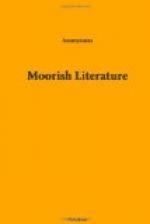“If, when the foe is face to face,
Thou boastest as thou oft
hast done
When far away his ranks were ranged,
And the fierce fight had not
begun;—
“Go, Zaide, to the Alhambra go,
And there defend thy soldier
fame;
For every tongue is wagging there,
And all, derisive, speak thy
name.
“And if thou fear to go alone,
Take others with thee to thine
aid;
Thy friends are ready at thy beck,
And Zaide need not be afraid!
“It is not in the palace court,
Amid the throng of ladies
bright,
That the good soldier, by his tongue,
Proves himself valorous in
the fight.
“It is not there his hands can show
What in the battle he can
do;
But where the shock of onset tests
The fearless heart, the iron
thew.
“Betake thee to the bloody field
And let thy sword thy praises
sing;
But silence is most eloquent
Amid the courtiers of the
King.”
Thus Tarfe wrote, the Moorish knight,
His heart so filled with furious
rage
That where his fiery pen had passed
It pierced and rent the flimsy
page.
He called his varlet to his side,
“Now seek the Alhambra’s
hall,” said he,
“And privately to Zaide say
That this epistle comes from
me;
“And whisper, that none else may
hear,
And say that I his coming
wait,
Where Genil’s crystal torrent laves
The pillars of yon palace
gate.”
THE ADMIRAL’S FAREWELL
The royal fleet with fluttering sail is
waiting in the bay;
And brave Mustapha, the Admiral, must
start at break of day.
His hood and cloak of many hues he swiftly
dons, and sets
Upon his brow his turban gay with pearls
and amulets;
Of many tints above his head his plumes
are waving wide;
Like a crescent moon his scimitar is dangling
at his side;
And standing at the window, he gazes forth,
and, hark!
Across the rippling waters floats the
summons to embark.
Blow, trumpets;
clarions, sound your strain!
Strike, kettle-drum,
the alarum in refrain.
Let the shrill
fife, the flute, the sackbut ring
A summons to our
Admiral, a salvo to our King!
The haughty Turk his scarlet shoe upon
the stirrup placed,
Right easily he vaulted to his saddle-tree
in haste.
His courser was Arabian, in whose crest
and pastern show
A glossy coat as soft as silk, as white
as driven snow.
One mark alone was on his flank! ’twas
branded deep and dark;
The letter F in Arab script, stood out
the sacred mark.
By the color of his courser he wished
it to be seen
That the soul of the King’s Admiral
was white and true and clean.
Oh, swift and full of mettle was the steed
which that day bore
Mustapha, the High Admiral, down to the
wave-beat shore!
The haughty Turk sails forth at morn,
that Malta he may take,
But many the greater conquest his gallant
men shall make;
For his heart is high and his soul is
bent on death or victory,
And he pauses, as the clashing sound comes
from the distant sea;




